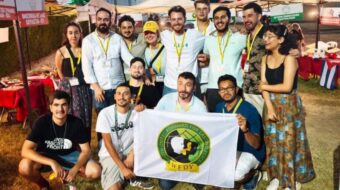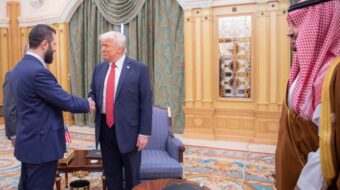
On Nov. 8 the United Nations General Assembly will vote on a Cuban resolution calling for an end to the U.S. economic blockade against Cuba. In preparation for the vote, Deputy Foreign Minister Bruno Rodriguez held a press conference in Havana, Oct. 2, where he released Cuba’s annual report on the blockade’s impact.
This will be the 15th year for a UN vote on Cuba’s resolution. In the process, support for Cuba has turned into huge majorities. The vote last year was 182 against the blockade, and only four (the U.S., Israel, the Marshall Islands and Palau) in support of it.
Speaking Oct. 3 at a neighborhood meeting in San Miguel de Padron, Foreign Minister Felipe Perez Roque said that over the past five decades Cuba’s losses from the blockade have amounted to $86.1 billion. Last year they were $4.1 billion.
The report underscores the effects of U.S. policies on other nations. For example, a Brazilian subsidiary of the U.S. Dresser Rand Group bought raw materials from a Cuban-Canadian joint venture. Under U.S. pressure, the turbine manufacturer was recently forced to close the subsidiary down and pay the Treasury Department $171,300.
Japan’s giant Nikon Corp. also falls under embargo rules.
Raydel Sosa Rojas, a 14-year-old Cuban boy, was a guest June 5 in Algiers on World Environment Day. The event at which he was honored was the culmination of a UN-sponsored competition for artwork among young people on environmental themes. Raydel’s painting had been chosen as representative of the art of Latin America and Caribbean youth.
Afflicted with hemophilia, the Cuban student received the plaque and artist supplies given to all of the young honorees. However, the others were each given a Nikon digital camera. A tearful Raydel did not receive one. Nikon chose to comply with U.S. legislation that bans entry into Cuba of foreign products that contain at least 10 percent U.S.-made components.
According to a report on www.cubavsbloqueo.cu, the blockade deprives sick North Americans of life-extending medications. Anti-cancer agents developed by U.S. companies in collaboration with Cuba’s Molecular Immunology Center have, with one recent and notable exception, been blocked from clinical trials in the U.S. (See related story, page 9.)
The Cuban Foreign Ministry report cites Citoprot P as another valuable Cuban drug unavailable to U.S. patients. Apparently effective in healing foot ulcers in people with diabetes, the preparation reduces the incidence of amputations.
Losses to the U.S. travel industry from the blockade are estimated at $996 million last year. U.S. visitors to Cuba, including Cuban Americans, fell from 203,000 in 2003 to 101,000 in 2005. However, Cuba’s overall tourism is thriving, with 2.5 million tourists last year, up from 1.9 million visitors in 1999.
U.S. importers of nickel and cobalt have lost out to world competitors by not having the ability to buy these minerals from nearby Cuba, which has substantial deposits of both. In fact, the Bush administration has recently created “an inter-agency task force on Cuban nickel,” aimed at identifying imports of alloys laced with Cuban nickel.
The U.S. government opened up Cuba to food exports in 2000, and revenues over the next four years amounted to $1 billion. In 2005, however, restrictions were tightened, and sales dropped to $474 million from an anticipated $750 million. U.S. farmers and workers were certainly hurt by these measures.
Speaking in Miami on Oct. 10, U.S. Attorney Alexander Acosta announced a task force aimed at tightening blockade enforcement mechanisms. Acosta warned of criminal prosecutions, jail terms and heavy fines. Critics suggest the Miami press conference was an election year maneuver.
Ricardo Alarcon, president of Cuba’s National Assembly, recently commented on a 1960 State Department memo advocating the denial “of money and supplies to Cuba, to decrease monetary and real wages, to bring about hunger, desperation and overthrow of government.”
Writing in Counterpunch, Alarcon said the U.S. blockade of Cuba is “probably the most prolonged act of genocide in history.” He added, “It began before the majority of Cubans alive today were born.”









